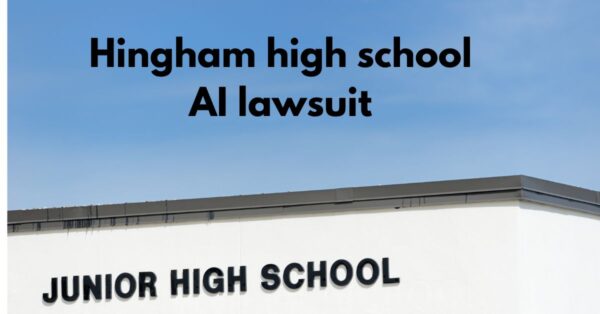Hingham high school AI lawsuit
The U.S. Magistrate Judge Paul G. Levenson wrote in a recent ruling drew attention to the ambiguities surrounding both how artificial intelligence can have important implications for academic integrity, and what rights students have. The case came after a Hingham High School student turned to AI to help write a history paper, which resulted in trouble for the student for doing so, raising a debate about the role of technology in education and what schools can or cannot do when it comes to how the student is using their resources.
The Case at a Glance
The suit, filed by the student’s parents, Dale and Jennifer Harris, alleged that administrators and teachers at Hingham Public Schools violated their son’s rights by disciplining him. The student’s lawyer, Peter Farrell, sought a preliminary injunction that would at least undo the immediate effect of the discipline, including the student being barred from the National Honor Society (NHS).
But in a blistering 47-page memorandum and order, Judge Levenson rejected the bid for a preliminary injunction on Nov. 20. His reasoning emphasized a respect for school officials’ autonomy to make decisions about discipline and academics, saying, “The nation’s youth belongs in the first instance to parents and teachers and state and local school officials, and not to federal judges.”
What to Know About the Court’s Ruling
A Five-Pronged Framework for Balancing the Public Interest and Individual Rights
- The plaintiffs also had no hope of prevailing on their constitutional claims, even with the public interest in protecting constitutional rights at an all-time high.
- The court said there was a public interest in enabling educators to perform their duties without distraction by lawsuits that could drain time and resources.
Deference to Educators
- Judge Levenson wrote that school officials were owed a “great degree of deference” regarding discipline.
- Granting a preliminary injunction, he wrote, would threaten educators’ ability to teach critical academic skills and to maintain discipline in a meaningful way.

Timing and Admission to NHS
- The student’s subsequent acceptance into the NHS just days after the injunction hearing was “not by coincidence,” Farrell said.
- The case illustrated disparate treatment of students who violated academic integrity policies, he wrote.
The Broader Implications
These questions are going to become especially critical in the current case, given increasing questions about the use of AI in education and what policies exist around the use of it. Farrell described it as a chance to address “larger policy questions around the implementation of artificial intelligence in the public school space.”
In summary, while the court’s ruling states caution, we recognize that AI poses novel and expanding challenges for educators both to maintain academic integrity. It also points to the limited utility of federal courts intervening to arbitrate school discipline, and that such issues are best determined by local educators and school leaders.https://www.boston.com/news/technology/2024/10/23/parents-hingham-student-disciplined-using-ai-sue-school/
Next Steps
Farrell stated categorically that this case is just getting started, even though the preliminary injunction motion was denied. He said he planned to pursue discovery to build the factual record and keep advocating for his clients. The outcome of the case could set important precedents for how schools treat AI use and enforce academic policies.
Final Thoughts
The Hingham High School case is just a microcosm of these challenges — and opportunities — presented by the arrival of AI in school environments. It invites questions about how schools can welcome technological progress without compromising academic integrity and equity. As this case unfolds, it may inform future discussions about the role of AI in classrooms and students’ rights when learning to navigate this new educational environment. READ MOREhttps://usavartalu.com/




